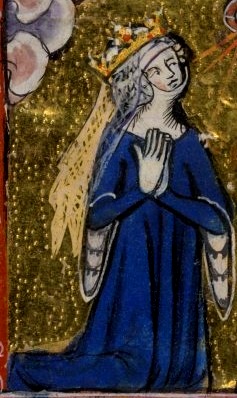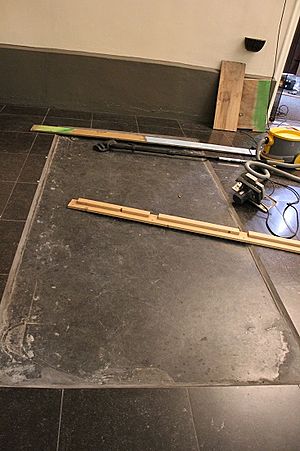Eleanor of Woodstock facts for kids
Quick facts for kids Eleanor of Woodstock |
|
|---|---|

A "portrait" probably representing Eleanor at prayer, in the illustration for the Hours of the Holy Spirit in the Taymouth Hours (London, BL MS Yates Thompson 13, fol. 18r)
|
|
| Duchess consort of Guelders | |
| Tenure | 1332 – 12 October 1343 |
| Born | 18 June 1318 Woodstock, Oxfordshire |
| Died | 22 April 1355 (aged 36) |
| Burial | Deventer Abbey, Salland |
| Spouse |
Reginald II, Duke of Guelders
(m. 1332; died 1343) |
| Issue | Reginald III, Duke of Guelders Edward, Duke of Guelders |
| House | Plantagenet |
| Father | Edward II of England |
| Mother | Isabella of France |
Eleanor of Woodstock was an English princess born on June 18, 1318. She became the Duchess of Guelders by marrying Reginald II of Guelders. After her husband's death, she served as a regent for her young son, Reginald III, from 1343 to 1344. Eleanor was also the younger sister of Edward III of England, a famous English king. She passed away on April 22, 1355, at the age of 36.
Contents
Eleanor's Early Life and Family
Eleanor was born at Woodstock Palace in Oxfordshire. Her parents were King Edward II of England and Isabella of France. She was named after her grandmother, Eleanor of Castile. When she was born, her father spent a lot of money on a special church ceremony for her.
In 1324, Eleanor was cared for by her cousin, Eleanor de Clare. Later, she and her younger sister, Joan of the Tower, lived with Ralph de Monthermer and Isabella Hastings at Pleshey.
Marriage Plans for a Princess
As a princess, Eleanor was part of many important marriage discussions. In 1325, there were talks for her to marry Alphonso XI of Castile. However, this plan did not work out because of issues with her dowry, which is money or property a bride brings to a marriage.
In 1328, Eleanor's new sister-in-law, Philippa of Hainaut, became her guardian. Philippa was married to Eleanor's brother, Edward III. More marriage talks happened in 1329. This time, it was for Eleanor to marry the future John II of France. The next year, the possible groom was Pedro, son of Alphonso IV of Aragon. But these plans also did not happen.
Becoming the Duchess of Guelders
In May 1332, Eleanor married Reinoud II "the Black," the count of Guelders. This marriage was arranged by her brother, Edward III, and her mother's cousin, Joan of Valois. Reinoud was older than Eleanor and had four daughters from a previous marriage. He was known for having a difficult personality.
Journey to a New Home
Eleanor sailed from Sandwich to her new home. She brought many valuable items for her wedding. These included a beautiful Spanish wedding gown, caps, gloves, shoes, and even rare spices and sugar. She was welcomed warmly in Guelders.
A Challenging Time
According to old stories, Eleanor faced a difficult challenge in 1338. It was said that she was sent away from court because people believed she had leprosy, a serious skin disease. Her husband was supposedly influenced by a priest named Jan Moliart, who played a part in these rumors. During this time, Eleanor is said to have lived in Deventer. She was very active there, helping the Franciscan Friars and giving money for their new church.
The stories also say that her husband tried to end their marriage. But Eleanor bravely went to court in Nijmegen to fight this. She showed everyone that she was healthy and did not have leprosy. This forced her husband to take her back. Sadly, he died on October 12, 1343, after falling from his horse.
Eleanor's Time as Regent
After her husband died, Eleanor became the regent of Guelders. This meant she ruled the land for her nine-year-old son, Reginald, until he was old enough. As regent, she had her old enemy, Jan Moliart, arrested and put in prison.
Challenges in Leadership
Eleanor's role as regent was officially recognized. However, she faced challenges from Jan van Valkenburg, a relative of her late husband. He wanted to share the regency with her. The situation became very difficult. Some accounts say that she had to give up her position as regent. Her son, Reginald, was then declared old enough to rule on his own in 1344, even though he was only eleven.
After stepping down, Eleanor retired and was known as the Lady of Veluwe. She spent much of her time supporting convents, especially those for poor nuns like the Order of Saint Clare. Later, in the 1350s, she had disagreements with her son Reginald. He took back some of her lands because they disagreed about making peace with his younger brother, Edward.
Death and Burial
Eleanor died on April 22, 1355, at the age of 36. This was twelve years after she became a widow. Legend says she was too proud to ask her brother, King Edward III, for help. She was buried in the Franciscan church in Deventer. Her tombstone had only her name, "ELEANOR," written on it. In England, there is an image of her and her husband on the south side of Philippa of Hainault's tomb in Westminster Abbey.
Eleanor's Children
Eleanor had two sons with Reginald II of Guelders:
- Reginald III, Duke of Guelders, also known as "The Fat" (1333–1371)
- Edward, Duke of Guelders (1336–1371)
 | Stephanie Wilson |
 | Charles Bolden |
 | Ronald McNair |
 | Frederick D. Gregory |


